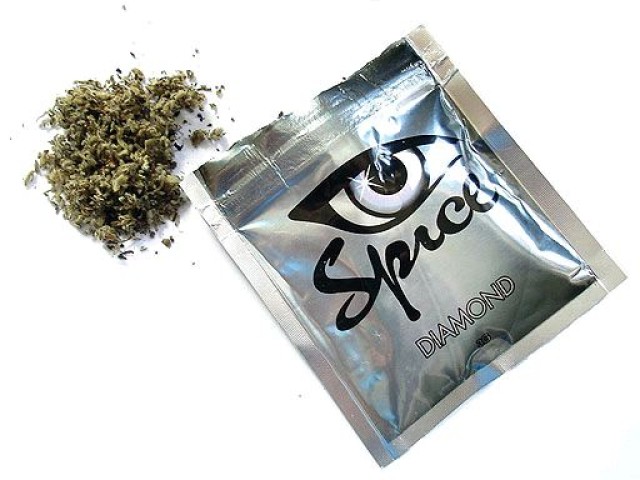
In a Nov. 24, 2010 press release, the U.S. Drug Enforcement Administration announced their action making it illegal to possess or sell ''Spice" and other products that mimic the effects of marijuana.
The DEA is using its emergency scheduling authority to temporarily control five chemicals (JWH-018, JWH-073, JWH-200, CP-47,497 and cannabicyclohexanol) used to make ''fake pot" products.
Except as authorized by law, this action will make possessing and selling these chemicals or the products that contain them illegal in the U.S. for at least one year while the DEA and the Department of Health and Human Services further study whether these chemicals and products should be permanently controlled, according to the press release.
These will be designated Schedule I substances, the most restrictive category, which is reserved for unsafe, highly abused substances with no medical usage, the DEA said.
''Over the past year, smokable herbal blends marketed as being 'legal' and providing a marijuana-like high, have become increasingly popular, particularly among teens and young adults. These products consist of plant material that has been coated with research chemicals that mimic THC, the active ingredient in marijuana and are sold at a variety of retail outlets, in head shops and over the Internet. These chemicals, however, have not been approved by the FDA for human consumption and there is no oversight of the manufacturing process. Brands such as Spice, K2, Blaze, Dawn and Red X are labeled as incense to mask their intended purpose," said the DEA.
JBM-HH was in the forefront of banning the use of such drugs, most commonly known as Spice, in 2010. ''We were already ahead of the game at JBM-HH with the regimental commander's directives that this was an illegal substance and would not be tolerated," said Fort Myer Police Chief William Johnson.
Spice cannot be used by members of the military assigned here. This policy is considered to be a lawful order, said Col. David P. Anders, commander of the 3rd U.S. Infantry Regiment (The Old Guard).
''The Old Guard represents the Army in the National Capital Region and throughout the world. Frequently our missions place us in close proximity to our nation's and other nation's highest political and military leadership. Our missions require immense discipline and precision. Soldiers that use Spice and its derivatives are more likely to make poor decisions, have substandard physical and mental health and potentially cause life threatening danger to themselves and those around them," said Anders.
''Now [the change in DEA policy] will change the charge. Formerly we would charge Soldiers with disobeying a lawful order. Now we will charge them with wrongful abuse and use of a controlled substance," Johnson said.
''This [DEA] information affects the way cases involving Spice are handled on Fort Myer, said Lt. Col. Kenneth Sheppard, provost marshal for JBM-HH Directorate of Emergency Services.
''Once it was categorized as a schedule I, dangerous drug, however, the Army Criminal Investigation Command now becomes more involved with these cases," Sheppard said.
Previously DES would handle cases on Fort Myer from processing evidence at the scene and doing the initial report, Sheppard said.
''Now we're waiting for the Department of Defense decision on DES handling these cases entirely," he said.
Sheppard and Johnson attended the Joint Law Enforcement conference for all the services stationed in the National Capital Region, hosted by the Joint Force Headquarters-National Capital Region and Military District of Washington in November 2009.
''We brought up the issue of Spice and all the challenges we were having with it here at JBM-HH. It was a surprise to a lot of the other services in the NCR that we were aware of Spice and had cases of Soldiers using it," said Sheppard.
''This topic got the ball rolling with awareness within the other services here in the NCR to try to look at a policy with the Military District of Washington, to make the use of Spice unauthorized."
Both Sheppard and Johnson give credit to The Old Guard regimental commander for adopting a policy within the Army community here.
''It is important to know that this dangerous substance is a synthetic drug marketed as incense or potpourri and can be stronger than marijuana," said Thomas DeCoster, JBM-HH Army Substance Abuse Program clinical director.
Since 2009 the DEA has received an increasing number of reports from poison centers, hospitals and law enforcements regarding these products.
Fifteen states have already taken action to control one or more of these chemicals. The Comprehensive Crime Control Act of 1984 amends the Controlled Substances Act to allow the DEA administrator to emergency schedule an abused, harmful, non-medical substance in order to avoid an imminent public health crisis while the formal rule-making procedures described in the CSA are being conducted, according to the release.
''The American public looks to the DEA to protect its children and communities from those who would exploit them for their own gain," stateded Michele M. Leonhart, DEA acting administrator, in the press release.
''Makers of these harmful products mislead their customers into thinking that 'fake pot' is a harmless alternative to illegal drugs, but that is not the case."
In February 2010, the director of the Missouri Poison Center in St. Louis notified poison centers nationwide about K2 after doctors reported a surge in patients sickened by it. Patients often have a rapid heart rate, dangerously high blood pressure and sometimes hallucinations or paranoia, the poison center said in its alert.
''I applaud the DEA's strong response to these dangerous substances and believe that their actions will lead to a safer environment for our Soldiers," Anders said.

Social Sharing